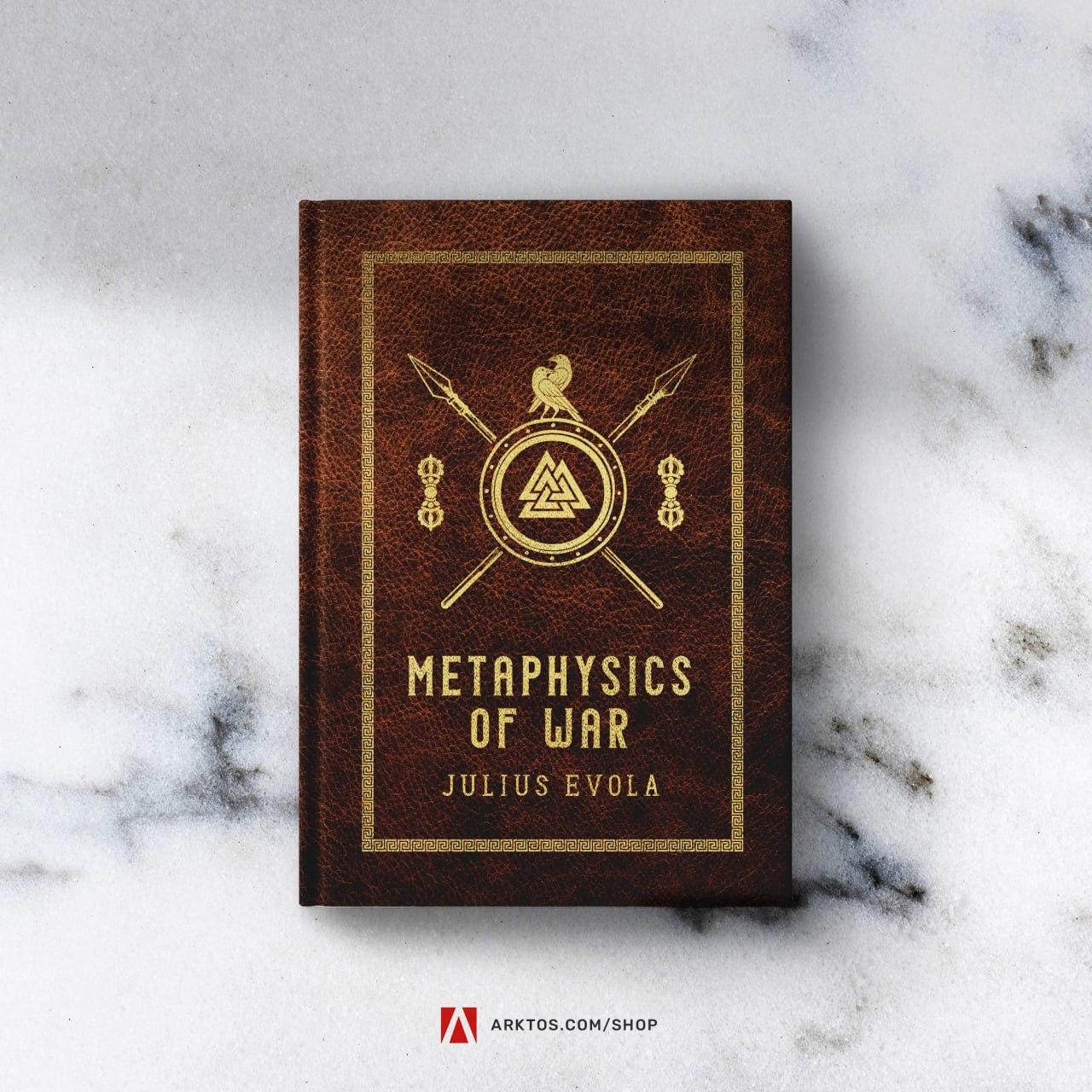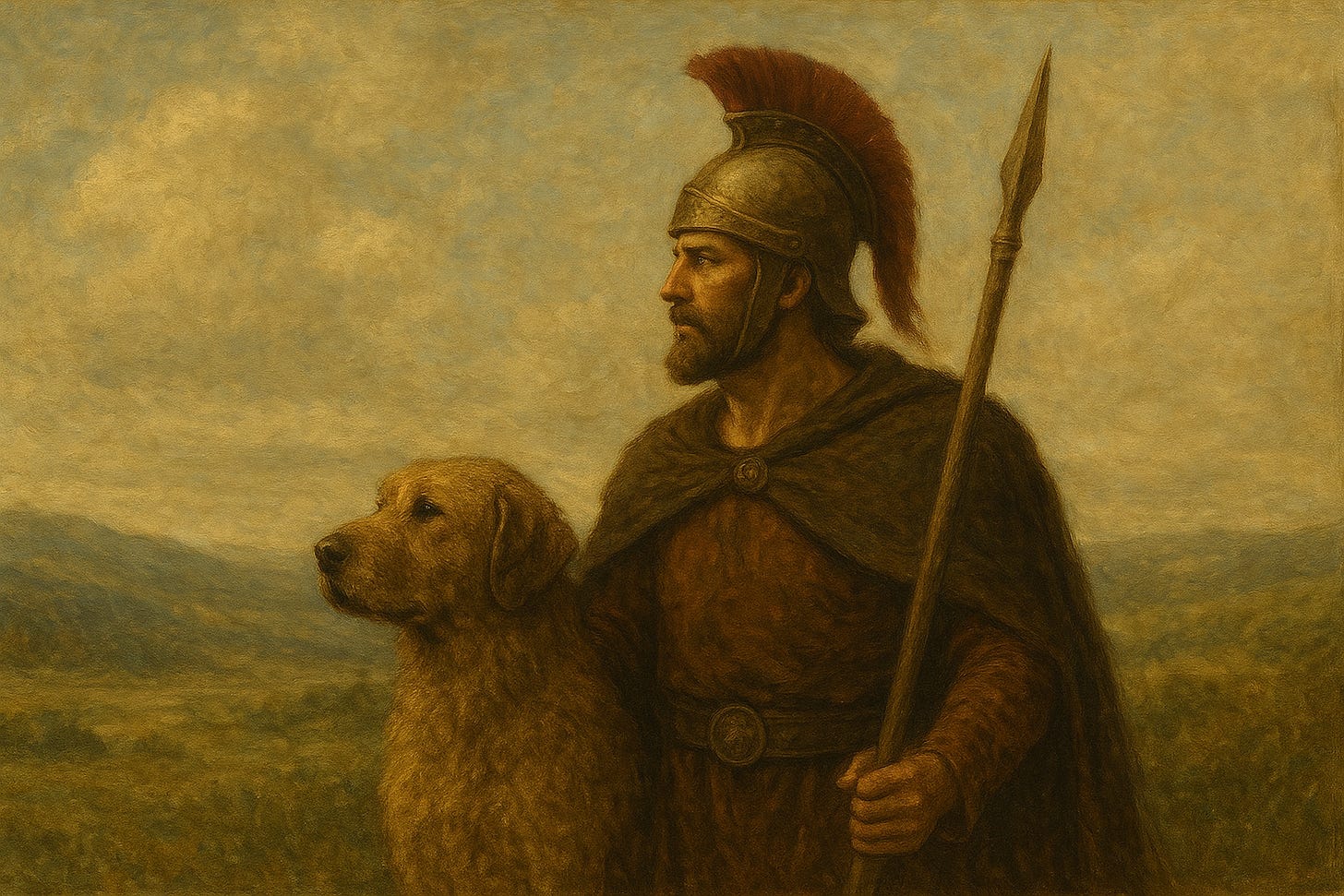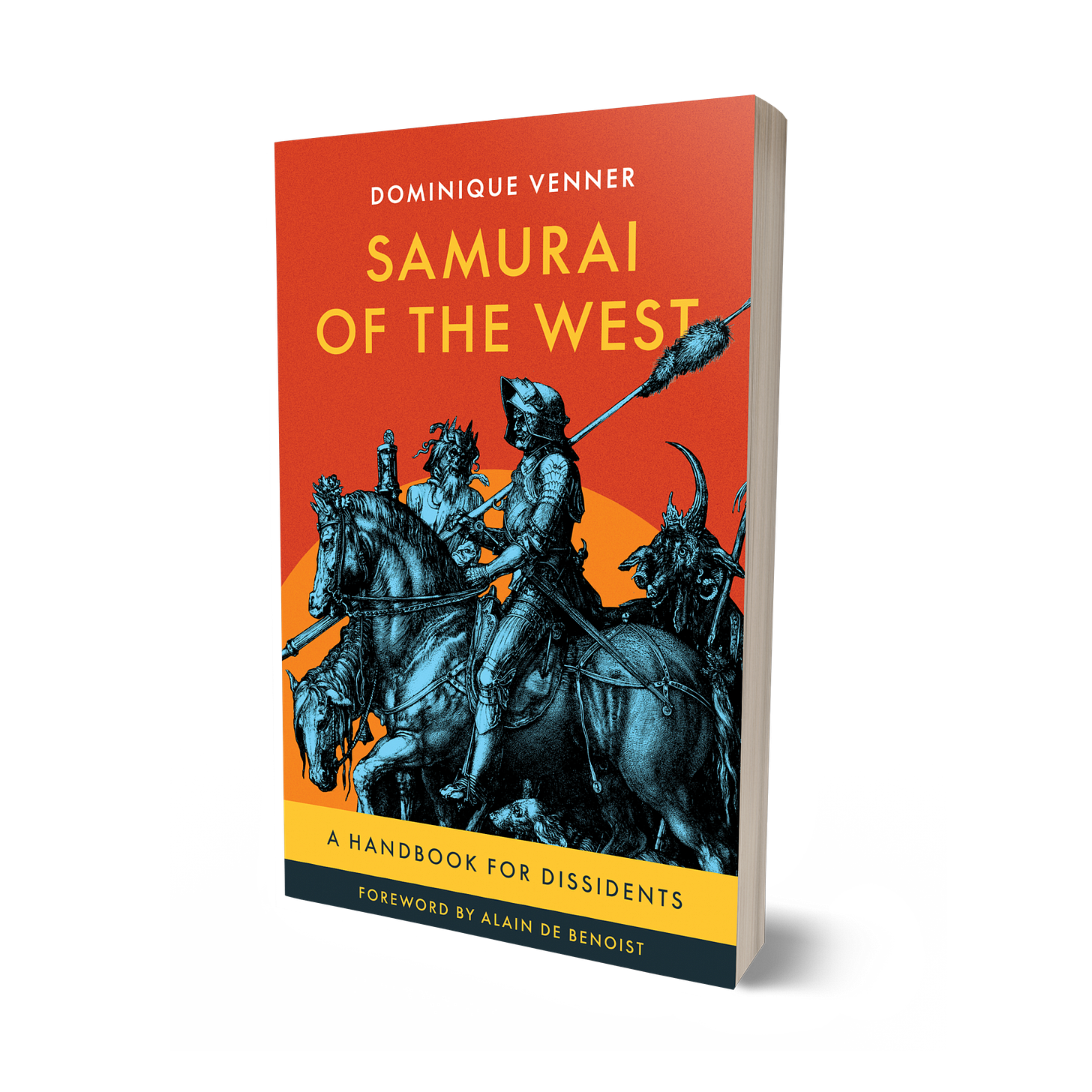Empathy of the Apex
by Rose Sybil
Rose Sybil discusses how empathy, protective care, and the capacity for thinking in terms of the apex are a crucial part of European consciousness and community, contrasting the dysfunction, guilt, and offloading which liberal ideology turns into self-hatred and xenophilia.
Karuna was my favorite dog. He was an American Bulldog and Staffordshire Terrier mix, an absolute beast of a dog. He once took down an Akita that attacked him. When a large dog growled at my son, Karuna grabbed him by the throat and pinned him to the ground. He displayed dominance with both aggression and self-control. When other dogs barked at him, he pretended not to see them and then urinated on or near them. He almost never barked. Yet, Karuna was the most loving dog with my children and his own.
I love dogs. There used to be a meme about Whites loving our dogs more than primitives. Yes! That statement is true. Their dispositions seem to mirror our own, and I can understand where our symbiotic relationship began. Karuna was extremely dominant with other dogs, but his daughter could take food right out of his bowl. He would jump up on my bed to cuddle my babies always on the side of the edge, keeping them from rolling off. Karuna was deeply loving, and we loved him just as much. When he grew very old, I saved his life at great expense and gave him love long past his years of strength in gratitude for the loyalty he gave my family.
Unlike primitives, we possess a deeper loving nature and complexity, even in what we consider dominant. This is not a weakness; in fact, great empathy and love are the marks of a higher-order apex. Our capacity for symbiosis mirrors our ability to form alliances and cooperate within groups, though it does not come without conditions. If my dog had ever shown aggression toward my children or harmed them, he would have been a dead dog. Only in decadent times has affection for our canine companions taken on such a distorted and harmful form that people prioritize other animals over their children.
Where do the animal mothers who love their pets more than their own children come from? There exists a disordered form of empathy, an unactivated or unactualized version of the real thing. What many call empathy is a kind of guilt born from a life lived too easily. Those who have endured hardship with others understand the cost of the gift of life. None take greater risks or show greater love than those who live on the edge of the food chain, both in the depths of the sea and upon land.
Liberals express the greatest sympathy for distant species or other subspecies/races because their “empathy” is actually guilt, not genuine understanding. Lacking personal actualization and any appreciation for the value of hardship, they project their own unearned ease onto others, mistaking dysfunction for merit. They feel guilty for lives of comfort without sacrifice, so they redirect that burden onto those most like themselves, people they can safely criticize and use as a proxy to soothe the needs of others. They know only ease, so they fail to honor the sacrifices of their own kin who made that ease possible, and instead offload blame and responsibility for hardship onto everyone else. Their self-hatred is projected onto their own people, which is why they can only offer sympathy (thoughts and prayers), not personal action.
When I first saw hunger as a child, I felt guilt for having plenty. This was not empathy, since I did not yet know the feeling of true hunger or the cost of earning food, but understood it conceptually. I knew that when I was hungry, I ate, and I wanted to soothe their hunger in the same way. Detachment from pain and the soothing of it is all that one can know if they have not experienced overcoming pain with others, this reinforces learned helplessness.
It was not until I felt hunger myself in early adulthood that I truly empathized. Biking through the Bay Area, I came across an old homeless veteran who moved me to continually bring him my food. Watching him eventually stop responding when I paid him a visit and then vanish nearly sent me into a complete breakdown. Pain in isolation is not a bonding force, but pain shared among others and overcome together is. To view pain as a teacher that balances the good is essential to the expression of empathy, for joy arises from the bonds built through facing and overcoming obstacles. The artificial environment we lived in did not allow for such overcoming, so the pain of hunger was not balanced by the hunt.
I went on my first hunt when I was ten years old. I had been around recently killed animals before, and saw them cleaned. It was not until I experienced their death firsthand that I truly understood it. My naivety and distance from death made the experience profoundly disturbing, coupled by the fact that no one explained what I was about to experience. I saw the most beautiful pheasants struck and fall in a flurry of colorful feathers. My loving dogs retrieved them so my father could break their necks. I felt sympathy for them, but not full empathy, for I am not a prey animal. The hunt was long and exhausting. My crying did not immediately result in comfort from my father, grandfather, uncle, or cousin. They were all very annoyed with me, and I had to continue walking miles in the freezing cold over harsh terrain while they killed more pheasants.
After the hunt, my grandfather explained more about his childhood. He loved animals deeply. He raised them for their down and meat, hunted for food and skins, trained pigeons, and raised hunting dogs. Our dogs lived for the hunt; cut paws did not phase them and was less pain than not living by their nature. He told me how sad he was as a child to kill geese and other animals. He loved them, but he also understood that it was part of their life cycle and our own as apex predators. He was happy that they were allowed a natural life and a quick death. His love and empathy for his family outweighed his pain over killing animals. My grandfather loved the pheasants; he respected their nests and only killed the males. With time I would no longer feel sympathy so acutely, and the harsh conditions of the hunt helped bring perspective.

From this difficult experience, I learned empathy for the apex — for the feelings of loss and the weight responsibility it carried. The harsh conditions we hunted in were miserable, but we endured them together, which deepened our bonds in the place of suffering. Reacting to this by being a vegetarian would be a rejection of the entire food chain upon which every animal depends. What may seem moral is an inability to cope with life as it is, rejecting the hard responsibilities of an apex. In areas where keystone species have been lost, we see what the apex upholds and where demonizing them leads. Mass farming across Nebraska has destroyed the habitats of the birds we once loved and hunted. This unnatural way of living is detrimental to the species entirely, whereas hunting them was not. Guilt for prey, ungrounded in real experience and instead rooted in utopian ideals, ultimately harms everyone.
Now that I have children, my desire to ensure they are not hungry is driven by love, not misapplied to feed all hominids at the cost of my children’s future. Love, experiencing harships, and the recognition that not all dysfunction can be cured are aspects of life that guide me. Yet, I balance this with encouraging my children to take risks, to train and toughen themselves, rather than simply soothe or coddle them. I am affectionate but not ever to prevent them from overcoming obstacles themselves. Empathy is not merely emotions of guilt or attempts to soothe; it is experiencing pain processed through the reflection of conscious understanding in the formation of meaning. Guilt should only arise when coupled with unmet responsibility, not taking on responsibility for the dysfunctional while preventing your own children from self-actualization.
I believe empathy enables us to think abstractly and creatively. To put oneself in the position of another is to grasp what lies beyond one’s own experience, which is integrative and can be a true strength. The ability to feel guilt and to love drives the capacity to overcome. Understanding the misfiring of a healthy trait is a matter of application, not of demonizing the trait itself.
We are complex beings, and those who do not bond with dogs, do not develop symbiosis, and do not feel guilt or love in the way we do should not be projected onto or expanded. Their lack of connection and guilt is not a strength, because there is no overcoming and no capacity to work in units. Those with actualized empathy understand when to cull, even if it is unpleasant, because it serves the whole. Empathy expressed as guilt is not a weakness unless it has never been forged through pain and love into strength.
The Aztecs did not have the capacity for guilt. They killed without meaning. Sacrifice without meaning is the mere transmutation of energy into different forms. It is a base and lower form of existence, as mechanization and materialism go hand in hand. Their void of meaning would prevent their ability to understand Greek tragedy or Roman comedy, as both require the capacity to empathize. Meaning is not only found in easy or pleasant feelings; loss, grief, and pain are all catalysts for growth and better than not having the capacity for such extreme love and loss. Non-empathetic groups can become traders, but not heroes, whereas the heroic consumes himself when there is a void of deep connection and overcoming.
Guilt is not an end goal. It is a raw substance, untempered by experience or understanding. The orca is the most empathetic animal; they will almost kill themselves in their grief, for such is the depth of their love. Yet, they can wear a salmon as a hat and be ruthless killers, for their empathy has direction. The mother orca who repeatedly loses her calves in the Puget Sound does not simply grieve in a manner we can comprehend, as her grief is not a performative show as seen in some cultures.
For her to push her child to the surface for seventeen days means she could not hunt or sleep and expended extreme levels of energy and pain because her emotional pain was so great. Attempting to earn our empathy was a great risk for her, yet we inhabit a world that no longer understands the empathy of an apex, only sympathy for prey or the escapism for inactivated guilt. Her sacrifice to catalyze action in us for our lapse of dominion in allowing her home to be poisoned with forever chemicals was in vain. Performative morality and soothing does not translate into real action.
Empathy must be tempered by both love and the experience of hardship and overcoming, always leading to directional sacrifice and action. This shapes empathy into a formidable force, for it is the capacity to love that can make some ruthlessly protective. Overcoming hardship enables the pushing of limits within the food chain itself; it drives evolution, and I do not mean this in a Darwinian sense. The ability to empathize is fully realized only when coupled with overcoming pain, understanding how one’s position relates to others near and far, and modeling by those with close generational bonds to provide a direction for sacrifice. Only then can you truly grasp the value and cost of things. Empathy does not dictate blanket compassion; it allows one to discern where to give compassion and to accept the sacrifice of giving it or the cost of not in the formation of meaning.
In the book On Killing, the psychological barriers to killing other humans are examined in depth. Most of the studies were conducted on Europids, so their findings should not be universally applied. I believe other races are capable of killing at higher rates without suffering the same psychological consequences. The research found that Europeans able to kill were not sociopaths; it did not correlate with a lack of empathy for others or an inability to love. Interestingly, oldest brothers were the most likely to be able to kill without repercussion, suggesting an epigenetic trigger that transforms protective love into the capacity to kill. Protective instincts born of love and tempered by overcoming hardship create the deadliest apex. Conversely, lacking the capacity to deeply love or feel guilt results only in an inability to derive meaning from experience.
Samurai of the West, equipped with a foreword and eulogy by Alain de Benoist, is now available from Arktos: ORDER NOW






